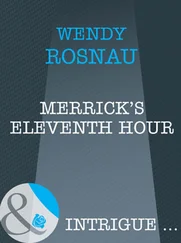Here’s what Romantic Times BOOKclub has to say about Wendy Rosnau…
“Rosnau’s debut single title is a wild roller-coaster ride. This romantic adventure has it all—psychotic madmen, a heart-stopping hero and endless surprises. A definite keeper…”
—on A Thousand Kisses Deep
“Wendy Rosnau’s feisty characters and their nonstop snappy banter provide enjoyable entertainment as an enticing mystery unfolds.”
—on Beneath the Silk
“Demonstrating a flair for romantic adventure and sizzling romance, Wendy Rosnau shines.”
—on The Right Side of the Law
“Ms. Rosnau proves herself a skilled interpreter of the romance genre.”
—on The Long Hot Summer
Undercover Nightingale
Wendy Rosnau
 www.millsandboon.co.uk
www.millsandboon.co.uk
Before you start reading, why not sign up?
Thank you for downloading this Mills & Boon book. If you want to hear about exclusive discounts, special offers and competitions, sign up to our email newsletter today!
SIGN ME UP!
Or simply visit
signup.millsandboon.co.uk
Mills & Boon emails are completely free to receive and you can unsubscribe at any time via the link in any email we send you.
resides on sixty secluded acres in Minnesota with her husband and their two children. She divides her time between her family-owned bookstore and writing romantic suspense.
Her first book, The Long Hot Summer, was a Romantic Times BOOKclub nominee for Best First Series Romance of 2000. Her third book, The Right Side of the Law, was a Romantic Times BOOKclub Top Pick. She received the Midwest Fiction Writers 2001 Rising Star Award.
Wendy loves to hear from her readers. Visit her Web site at www.wendyrosnau.com.
Prologue
Chapter 1
Chapter 2
Chapter 3
Chapter 4
Chapter 5
Chapter 6
Chapter 7
Chapter 8
Chapter 9
Chapter 10
Chapter 11
Chapter 12
Chapter 13
Chapter 14
Chapter 15
Epilogue
Barinski was humming to himself, his black-rimmed glasses perched high on his protruding forehead when the Chameleon entered the soundproof cubicle in the bowels of the mosque.
Some people should never reproduce. That’s what had come to mind the first day he had met Nigel Barinski. The peculiar-looking scientist was a mutation of bad genetics—arms that hung at his sides like an ape, and a pair of short legs to cement the concept. He had a receding chin, oversized ears, too much curly red hair, and a pair of unnatural glass-bowl goldfish eyes.
But appearance had nothing to do with intellect. In Barinski’s case, the price for his gift of genius was his misshapen body and Frankenstein face.
The Chameleon dismissed Barinski for a moment and focused on the woman on the other side of the two-way mirror strapped into Barinski’s two-million-dollar chair, in what he called the regeneration chamber. Her eyes were closed, and she was calm, as if she was in a dream-like state. A much different story than when she’d first been brought to him.
“How is she progressing?”
“On schedule.”
“No surprises?”
“None.”
The Chameleon stepped closer to the window. He’d first seen her in Munich. She’d been scaling a fifty-foot wall, her curvy body suspended from a guide wire as if it was a part of her instead of her lifeline.
He’d never seen a woman with so much courage packaged so beautifully. He had found her bravery as arousing as her curves, and in that moment he knew he had to have her. Knew she would be the perfect guinea pig for Barinski’s latest genius.
Barinski flipped a switch. “Kalimera, Nightingale.”
She opened her eyes as if Barinski’s voice had turned on a lightbulb inside her head. “Good morning.”
“Did you sleep well?”
“Yes. I dreamt about Bonnie.”
The Chameleon turned the switch off. “Who’s Bonnie?”
“Her mother. A slut, from the information I’ve gathered.”
“I don’t care about her childhood, or her mother.”
“You should. The scientific data on a child’s adaptability into society parallels what they have been taught. It’s one of the reasons you’re so taken with Nightingale. She’s a product of suffering, and sacrifice. She knows how to survive.”
“Because she hates her mother?”
“No, because she loves her. All children love their parents. Even when they hate them.”
The Chameleon would have accepted Barinski’s theory if he didn’t have proof that on this particular point he was as crazy as he looked. His own daughter hated him, and it would take a miracle to change Melita’s mind.
“Enough about children loving their parents even if they hate them,” he said, then flipped the switch and spoke into the vibration grid that would distort his voice. “Do you remember Munich?”
She hesitated a moment. “I’ve never been to Munich.”
“Brussels, how did you like it there?”
“I’ve never visited Brussels.”
The Chameleon glanced at Barinski. “She really can’t remember?”
“I’ve left her childhood recall intact, but the past six years are gone.”
“Very good, Barinski.”
Like a puppy whose head had just been patted, Barinski turned warm and fuzzy, his goofy grin making him look even more ridiculous.
“By the end of the week I’ll start entering your data. If you want her to remember Munich, or a portion of what she’s lost, she will. If not, she won’t.”
The Chameleon turned back to the two-way mirror and searched her eyes for the fire he remembered. It wasn’t there. She was a blank canvas, and he was suddenly disappointed in that.
“You’re sure once the procedure is complete that she’ll function as before?” He turned to Barinski. “I don’t want her ending up a damn freak.”
There was a moment of silence. Obviously Dr. Frankenstein was touchy around the word “freak.”
Barinski cleared his throat, and it sounded as if he was flushing a toilet. “She’ll have the same advanced skills as before. I’ve been keeping her physical workouts short but intense, and she’s on a special diet. A month to integrate her skills with your data and she’ll be as dangerous as when she was captured. Only she’ll be working for you.”
The Chameleon left Barinski to his work and climbed the stone steps to the tower. It was perhaps the most invisible place on earth—this abandoned mosque tucked into a craggy hillside on Despotiko. The Greeks called it “The Goat Island,” a barren islet surrounded by a jagged coastline with a goat population that outnumbered the islanders.
Although he owned a number of hideouts, lately the Chameleon had been spending a lot of time at Minare—the name he’d given the mosque because of its tall slender tower that jutted high above the abandoned ruins.
When he walked out into the warm island air, he was surprised to see that Melita was already there. Usually she made him wait when he sent for her.
She was gazing out over the water, her long black hair glistening in the sunlight. Like her mother, she had an angel’s face and soft vulnerable eyes.
Fiora. He hadn’t thought about Melita’s mother in years.
“Thinking about jumping to your death?”
She turned, and the pain in her eyes told him she still suffered. That after a year she still hated him for his part in her torment.
“I used to think about it every day when I was first brought here. But no longer. Hello, Father.”
Читать дальше

 www.millsandboon.co.uk
www.millsandboon.co.uk










